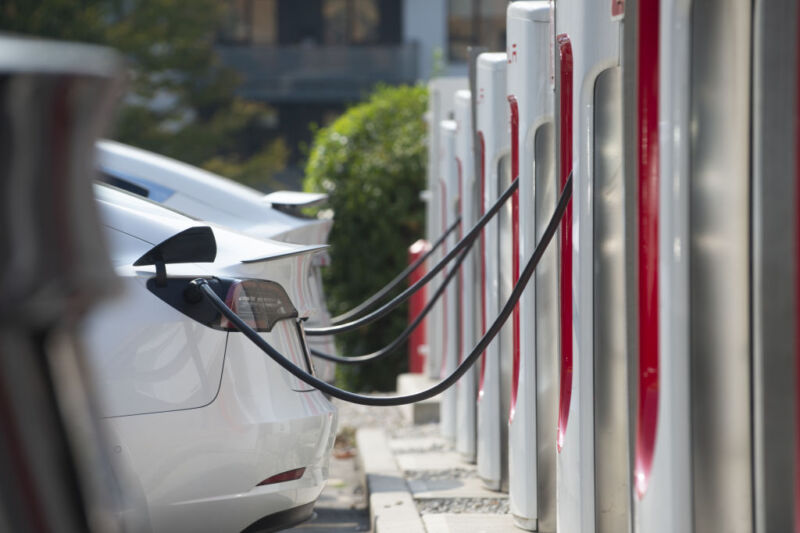
For drivers choosing electric vehicles, convenient access to reliable charging stations remains one of the biggest pain points after adopting the eco-friendlier way to cruise. Just the thought of driving out of the way to find a charging station when planning road trips—rather than pop into a choice of many gas stations at any exit—deters so many drivers that it was starting to look like unreliable charging could be the deciding factor that could ultimately doom EVs.
Instead, the Department of Transportation and the Biden administration announced yesterday that America greenlit a plan to invest $5 billion over the next five years to create a more reliable charging network by installing EV chargers in all 50 states, the District of Columbia, and Puerto Rico. The first wave of funding is available now, granting access to all states to “more than $1.5 billion to help build EV chargers covering approximately 75,000 miles of highway across the country.”
“President Biden is leading the shift to electrify transportation—ensuring drivers can commute and charge confidently and affordably and lessening our oversized reliance on fossil fuels while combatting climate change,” US Secretary of Energy Jennifer M. Granholm said in the press release.
The plan is to sprinkle hundreds of thousands of additional EV chargers along interstate highways, including in places where people would least expect to find them. Biden hopes this will decrease hesitancy among car buyers to invest more in EVs, so that half of all new vehicles sold in 2030 will be zero-emissions vehicles. That could reduce vehicle emissions, the DOT press release said, by “50-52 percent below 2005 levels by 2030.”
This significant advancement in EV charging infrastructure comes a little more than a week after the US Departments of Energy and Transportation appointed the first executive director charged with leading the Joint Office of Energy and Transportation, Gabe Klein. In a press release announcing Klein’s new role, DOE and DOT said Klein was specifically brought in to oversee efforts to “build a national electric vehicle (EV) charging network with a focus on filling gaps in rural and disadvantaged communities and hard-to-reach locations.”
To help underserved communities, cities, and states prepare their EV charging plans now that funding is available, Klein’s team will be available to provide technical assistance and analytical support.
Klein was not available to comment on the Biden administration’s latest move. However, a DOE representative provided Ars with a statement from Klein, saying his next steps would be to combine private and public investments “to support the deployment of 500,000 electric vehicle chargers nationwide,” ensuring “equitable access to affordable transportation,” in line with Biden’s goal to deliver “40 percent of the benefits from federal climate and clean energy investment in underserved communities.”
According to DOT, 35 state plans have already been approved, and some states have already started staffing local efforts to expand EV charging. Now, those states can be reimbursed for their efforts, plus access funding for initiatives like upgrading existing chargers, funding construction of new charging infrastructure, covering necessary operation and maintenance costs, and updating road signs to point people to new charging stations. Acting Federal Highway Administrator Stephanie Pollack said in DOT’s press release that the new initiative would quickly form “the backbone of our national EV charging network.”
The US has tried offering various incentives to convince car owners to switch to EVs, and researchers have identified a robust, cost-effective charging infrastructure as a necessary component of encouraging mass adoption. However, part of a robust infrastructure includes ensuring that charging stations are reliable and function when the drivers arrive, another consumer complaint that the new funding also seeks to address.
Last year, Georgia Institute of Technology climate and energy policy expert Omar Asensio reported with his research team in the Cell Press journal Patterns that AI could help states track the functionality of charging stations.
Asensio told Ars that the new charging infrastructure funding would help address current user concerns his analysis found over uneven distribution of charging stations. His team analyzed millions of EV charging reviews and concluded that “based on the rate of consumers leaving reviews at charging stations across the United States, we find that the deep-learning algorithms can detect the functioning of a certain station, daily.”
Klein, who previously served as commissioner of the Chicago Department of Transportation and director of the Washington DC Department of Transportation, is a vocal advocate for electrified transportation. He shares Biden’s views that expanding EV charging infrastructure is key to reaching US climate goals, considering, as the DOT press release noted, that the transportation sector is currently “our country’s largest source of greenhouse gas emissions.” He vowed to be a driving force pushing the country to embrace greener roadways.
“I will seize the opportunity to steward a critical shift in our transportation economy from fossil fuels to clean, electric energy systems, as there has never been a more important mission in our recent history than solving the climate crisis,” Klein said in DOE’s press release.
https://arstechnica.com/?p=1885357

